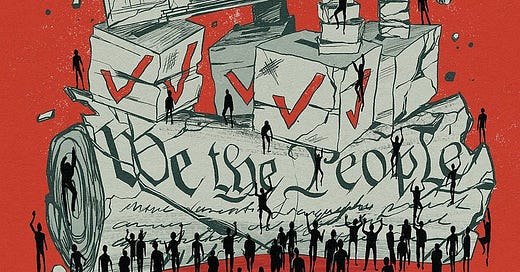Lesson #1: How to Win Friends and Influence Cultists at a Trump Rally
There is a simple justification for why MAGidiots are okay with Trump's promised dictatorship: 'The US is not a democracy.'
Journalist: “Do you think Trump is a threat to democracy?”
Trump cultist wearing a dopey red hat and an oversized t-shirt with Trump’s orange visage staring back at us ponders the questions.
“First of all, America is not a democracy. It is a republic.” Others in earshot agree loudly. The cultist takes on a candy-apple glow of pride, feeling as if he has finally established himself as the Revolutionary War citizen soldier he has always fancied himself.
“Okay, good point. Can you tell me the difference between those two?”
The cultist is perplexed, and his brain is forced into no man’s land. It has pried itself out from behind the barbed wire of Fox News/Trumpist slogans and has shifted gears into thinking mode. It is clear to everyone that he has lost balance and his way in this discussion.
“Well, democracy is less about the people than a republic.”
This was an actual conversation. If you are feeling lost by this answer, go to a Trump rally and repeat those words repeatedly. People will not just accept you; you will begin to feel so “a part of the in crowd” that you might change your political persuasion. Trumpists reward each other for stupidity, and it can really be mildly intoxicating.
So, what is democracy? Does democracy differ from “a republic,” as all right-wingers so confidently tell us? So, is the United States a democracy?
Yes, the United States is a democracy since we, the people, hold the ultimate political power. We’re not a “direct democracy,” but we are a “representative democracy.”
This is where our history education might add some confusion. We are commonly taught that democracy is a product of ancient Greece. It’s their word — demokratia — after all. The city-state of Athens is credited with implementing a system of government of and by the people, whereby eligible citizens would congregate to make decisions. They’d make these decisions themselves (or “directly”), not through any elected representatives.
That system of government, better understood today as direct democracy lives on in the United States in the form of ballot initiatives and referenda. Some states and localities allow citizens to use these measures to directly enact, change, or repeal laws themselves.
More commonly, we exercise our political power in a different way: by voting in elections to choose our representatives. That’s representative democracy (Democracy or Republic?).
The next question is whether or not the United States is a republic.
Yes. The United States is a republic because our elected representatives exercise political power.
History also tells us that Rome was a republic, unlike Athens. When its monarchy was overthrown, Rome developed a republican system of government whereby citizens elected officials who were empowered to make decisions for the public. That’s the core of how our government works. While “democracy” and “republic” have been historically pitted against one another, the reality is that the two terms enjoy considerable overlap (Democracy or Republic?).
When Trumpists make those “really smart” statements that the U.S. is not a democracy, you can safely tell them that it is. The United States is a “representative democracy,” or, in other words, a “republic.” This is a misconception that 99.9 percent of cultists on the right have but one that no one at Fox News or other infotainment organizations considers important enough to explain. We, of course, know that Fox needs its viewers ignorant and angry.
The right’s misuse of the democracy and republican terms provides Trumpists with a safe out when his promised dictatorship comes to fruition shortly after a possible victory in January. Once he begins to quash our democratic rights, the cultists can point to the fact that we “were never a democracy anyway.”
So what’s so wrong with U.S. constitutional democracy? One might say that it was cursed by success. The Constitution has survived centuries of epochal change and existential conflict, lending the country bragging rights for operating under the world’s oldest continuing formal government charter. The downside of that endurance is that the American political process remains at once stamped by the preoccupations of eighteenth-century political thought — most notably, fears of popular democracy, of the potential tyranny of majorities, and of the prospect of regular and entrenched political conflict — and distinctly untouched by institutional innovations and normative developments that came later (Democracy Is in Peril).
Everything is in place, my fellow citizens, for our democracy to be ended without even the slightest hint by the guilty parties that they are doing anything wrong.
All I can say is vote blue and only blue in November.



